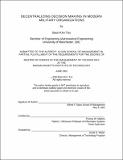| dc.contributor.advisor | Thomas W. Malone. | en_US |
| dc.contributor.author | Tan, Boon Kim, 1969- | en_US |
| dc.contributor.other | Massachusetts Institute of Technology. Management of Technology Program. | en_US |
| dc.date.accessioned | 2005-05-19T15:37:15Z | |
| dc.date.available | 2005-05-19T15:37:15Z | |
| dc.date.copyright | 2003 | en_US |
| dc.date.issued | 2003 | en_US |
| dc.identifier.uri | http://hdl.handle.net/1721.1/17005 | |
| dc.description | Thesis (S.M.M.O.T.)--Massachusetts Institute of Technology, Sloan School of Management, Management of Technology Program, 2003. | en_US |
| dc.description | Includes bibliographical references (leaves 108-111). | en_US |
| dc.description | This electronic version was submitted by the student author. The certified thesis is available in the Institute Archives and Special Collections. | en_US |
| dc.description.abstract | For organizations, the value of information is to improve decision making. In the military in particular, information's role in warfare has always been to affect decisions at all levels -- from strategic to tactical - to put one's forces in a position of advantage. In the information age, the cost of communicating such information has been so phenomenally reduced that it now becomes possible for individuals and entire organizations to tap vast amounts of information. This thesis seeks to address the question of how the modern military can best be designed to harness the power of the information revolution to enhance its ability to make faster, better decisions and thus to become more effective in war as well as in times of peace. To do so, the thesis first considers lessons from military history on the essence of decision making, analyzes the implications of the declining cost of communications and examines new organizational trends in both the corporate world and the military. With this foundation, new organizational designs for the military are proposed and scenarios for their use are described. These new organizational designs are optimized for the information age and incorporate increasingly decentralized making structures. Noting that such formal organizational restructuring by itself is inadequate, the thesis then looks at the shifts in leadership orientation and organizational culture necessary to create the environment that encourages empowerment of individuals as well as the competencies for the individual that are becoming increasingly important in an increasingly decentralized world. Finally, a framework that synthesizes the different ingredients necessary for designing the military organization in the 21st century is proposed. | en_US |
| dc.description.statementofresponsibility | by Boon Kim Tan. | en_US |
| dc.format.extent | 111 leaves | en_US |
| dc.format.extent | 245815 bytes | |
| dc.format.extent | 245566 bytes | |
| dc.format.mimetype | application/pdf | |
| dc.format.mimetype | application/pdf | |
| dc.language.iso | eng | en_US |
| dc.publisher | Massachusetts Institute of Technology | en_US |
| dc.rights | M.I.T. theses are protected by copyright. They may be viewed from this source for any purpose, but reproduction or distribution in any format is prohibited without written permission. See provided URL for inquiries about permission. | en_US |
| dc.rights.uri | http://dspace.mit.edu/handle/1721.1/7582 | |
| dc.subject | Management of Technology Program. | en_US |
| dc.title | Decentralizing decision making in modern military organizations | en_US |
| dc.type | Thesis | en_US |
| dc.description.degree | S.M.M.O.T. | en_US |
| dc.contributor.department | Management of Technology Program. | en_US |
| dc.contributor.department | Sloan School of Management | |
| dc.identifier.oclc | 54367257 | en_US |
